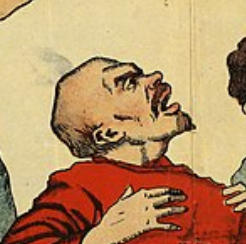Deleted
I support the original copyright laws in the US. Mostly the same as we have now, but you were only automatically given 17 years of copyright protection, plus an additional 17 years if you filed for an extension. Effectively, you got a maximum of 34 years of copyright, not this 100+ years atrocity we have now. Imo, anything beyond that is corporate theft of the public domain.
Also, if you’re awful to consumers like Nintendo is, the gloves come off. I believe piracy as a form of protest is morally sound
10 years limit, absolutely non transferable, limited to human beings (not abstract legal entities) .
Eventually extendable to lifetime of the creator if the work is still being developed, to prevent being usurped by copycats.I also believe that facilitating voluntary sponsorship (a la patreon, but without letting 10% get siphoned by leeches) is preferable to selling works. Especially since distribution is now pretty much free.
Even 10 years seems like too much. Most of the revenue is made in the first year with most music, TV, movies, and books.
Copyright is just one of the many fixes for inherent problems in capitalism. It needs to exist in capitalism because otherwise you’d just make the problems even worse. But it’s an innovation crippling system that (like everything in capitalism) only benefits the rich. So no copyright shouldn’t exist, just like capitalism.
Yes, copyright is necessitated by artists only being able to survive and prosper when their art is commodified, and the dynamics of capitalism ultimately push it into more and more making culture a tradeable commodity, ultimately alienating the artists from their works. Copyright will stay around and expand it’s reach, as well as mutate to benefit capital (and with that, capitalists), as long as the dynamics within the system are what they are.
I believe in the concept that if you create something, you should be able to profit from it. What I take issue with is hoarding ideas and properties (particularly artwork) in a way that prevents others from enjoying them in their own way.
It gets more complicated with art. An artist no longer owns that art once it’s in the public. Sure, they own the original idea and should be able to support themselves with that, but if I want to make a derivative work then there should be no barriers to allowing me to do so.
It’s a hard line to walk, and I’m constantly reevaluating where I think that line is. Right now piracy for me is a way of “test driving” content. If I like it and want to support it, I will purchase it later. This is how I am able to have bookshelves filled with books I’ve actually read, and video games I’ve actually played. The ones I don’t enjoy/buy were never going to get a purchase from me anyhow, so they’ve lost nothing.
I’m not nearly intelligent or well-read enough to know how to apply that to modern copyright laws, but that’s the essence of how I see it.
Kind of hard to notice copyright laws when I’m busy sailing and feeling the fresh ocean breeze.
Yo ho haul together, Hoist the colors high.
I think the 20-40 year range for copyright is fine, and I think copyright itself is fine too when it is in the same ecosystem of strong pro-privacy laws. However currently copyright is broken, it lasts far to long as is “Complimented” further laws that are absurd.
copyright or not. im still downloading a car
Copyright laws are quite bad as they look today imo. They are supposedly made to improve creativity but when big companies buy up different IPs and patents they stifle the creativity more than anything. Look at fantastic four, Sony has the movie rights for that IP and they damn make sure that they produce movies often enough that they keep it, but only juuust often enough. If some other studio, small studio or indy producer wants to try they should be able to.
Another thing is lotr, Amazon has the rights for some parts but not all, meaning they can not write about a character if it wasn’t in the ending section of the books. This stifles their creativity, and it’s not even the author that controls this - it’s the descendants! Why does the descendants have such control over something they did not create is beyond me…
If any of you haven’t seen it, this TED Talk by Nina Paley titled Copyright is Brain Damage is worth a look. I can’t imagine anyone here that wouldn’t appreciate her take.
I’m kind of with a lot of the other people here it seems, but for me:
- 10-15 years max, that should be more than enough to make plenty of money from whatever you create, then it belongs to the world. I’ve heard people argue against this with: what about when the artist gets older and has to retire? Or, what about leaving something to their kids? Well, save and budget properly and learn how to live on your pension, just like everybody else.
- Copyright belongs to the person who made the thing. A legal entity like a corporation can lease the right to use the thing, but it can’t own the thing.
- If the copyright holder dies before the copyright term is up, it goes to the public domain. Someone tried to argue with me once that this would lead to artists being killed so people could get out of paying them, but I’d counter that the instances now of artists being killed so someone else can inherit their copyright is basically zero so I don’t really see why it would go any differently the other way.
Some of that probably needs dome fine-tuning, but it has to be better than the current system whereby you end up with mega-corporations endlessly milking shitty derivative works out of someone’s creative efforts a century after they’re dead, or people who’s full-time job is to cash-in on something their grandfather wrote, the copyright now having become multi-generational.
If the copyright holder dies before the copyright term is up, it goes to the public domain. Someone tried to argue with me once that this would lead to artists being killed so people could get out of paying them, but I’d counter that the instances now of artists being killed so someone else can inherit their copyright is basically zero so I don’t really see why it would go any differently the other way.
Um yea… I don’t like this idea. I rather just have law that sets a time where upon publication, a timer starts. The term of the copyright should not be depedent on the health of a person. What if a writer die like a week after publishing a bestseller that would’ve made millions? Their family shouldn’t be deprived of the money just because the writer has bad health.
But all your other points seem reasonable.
Oh yeah I can definitely see that. I was thinking in terms of avoiding the “what if someone was murdered for their copyright?” argument, by just removing any incentive for that to happen. But then obviously that can cause other problems too. Like I say, it needs some fine-tuning!
Strongly opposed, but instead of writing a way too long comment explaining too little or getting into useless arguments with those pro, I‘m gonna tell you about something which says more and better than I ever could:
“Against Intellectual Monopoly” by Michele Boldrin and David K. Lavine, it can be found to download on Anna‘s Archive, right on the front page too. I think it is part of what inspires this project and others like it.
As an IP attorney I support what I call “The Founder’s Copyright”
- 15 year term, plus and additional 15 is you re-register.
- mandatory registration. None of this auto-registration
- mandatory copyright notice (Copyright © 2023)
- no moral rights
- no retroactive copyright extensions (should have been unConstitutional, bad SCOTUS specifically Ginsburg who wrote that opinion)
- recognition in the law that computers and the internet work by copying. This blanket prohibition on copying causes judges to make workable exceptions and intentional ignore the ludacris parts of the law.
- as a bonus, I think you should be required to give 2 full copies of whatever you register for archiving.
If they roll back copyright law to the state it was in in 1830, I’d support it again.
So we’re all in here saying “shorter copyright would be great” but still pirating stuff which came out last week?
It’s not piracy, it’s surprise acquisition.
i’m only borrowing it i’ll put it back once i’m done
Or in more official terms. This is not a declaration of piracy. We are only conducting special archival operation.
“Streaming will make piracy disappear in 3 days!”
No, streaming will make torrents appear in only 18 hours.Heh - except it’s more like a a couple of minutes
Copyright should be shorter. Everyone should also be given the money needed to live a decent life.
Leaning towards the shorter times, as in 10 years by default, with two additional extensions of 10 years up to a maximum of 30 done by filling paperwork and paying a fee. This time frame would provide plenty of opportunity for work to be monetized by their creator, and as well as there being room for continued monetization up to a realistic (IE non eternal) limit. While providing space for new generations to develop things that were abandoned, and the next generation to remix something they enjoyed as children.
Do note, I believe that this discussion has little to do with Piracy. While a thing entering public domain would mean that it could be distributed freely, I’m largely concerned about the creators and their ability to remix existing properties, as unfortunately, you can’t really pirate copyrights. Everything created based on another’s work (which lacks special permissive licensing) is always dancing on the knives edge of the owner’s whims.
With the system as it is, anything that released when you’re a five year old, you can only legally remix it when you’re so old you can’t remember it anymore. (And that’s if you’re lucky)
10 years seems fair enough







